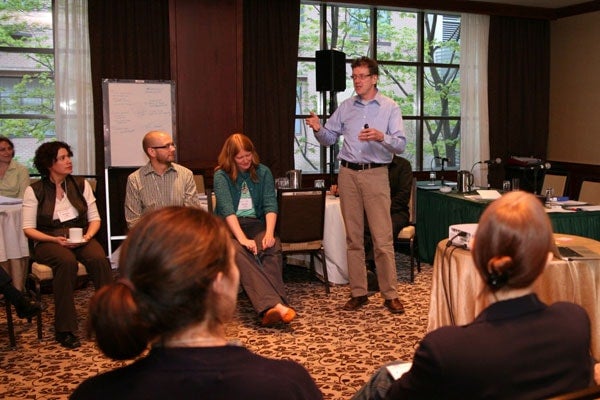
Speaking science in a common language
Published: May 8, 2013
Being a Canadian researcher isn’t easy: having to juggle researching, teaching, running labs, overseeing graduate students, applying for funding grants, presenting papers at conferences and publishing in academic journals.
And, on top of all that—perhaps hardest of all—they must communicate findings from their complex research to the public, media and government.
“When I talk to people about tissue engineering, they think there’s no way they can understand it,” said Alison McGuigan, an assistant professor of chemical engineering at U of T. “But you can show them how to understand it.”
To help Canada’s leading scientists and social scientists become even more effective communicators, the University of Toronto’s science engagement team launched its Science Leadership Program at Toronto’s Hotel Intercontinental on May 2. The three-day event drew scientists like McGuigan as well as researchers from institutions across the country who wished to develop their communications skills.
“When you deal with extremely technical things, sometimes relating things back to the day-to-day can be a problem,” said McGuigan. She added that the Science Leadership Program taught her the value of storytelling in making her research come alive for listeners.
Conference attendee Kathryn McWilliams, an associate professor at the University of Saskatchewan, described the challenge of learning to share research with the general public versus academic audiences.
“When scientists speak to the media, we tend to explain, explain, explain,” she said. McWilliams added that researchers often speak to the public in the same way they do in ‘adversarial’ academic discussions, though such an approach can make science stories inaccessible a general audience. “Only when we are sure that we have convinced the public of our sound reasoning, do we tend to tell the public our conclusions.”
Professors McGuigan and McWilliams were just two of more than 25 participants from universities across Canada attending the program. Researchers were experts in a diversity of fields including physical education, chemical engineering, psychology, physics, biology, marketing and geography.
“Make your passion for your subject contagious,” advised Kate Cassaday, a senior editor at HarperCollins, speaking to researchers during a breakout session on getting popular science books published.
Participants received tips from Cassaday and other guest speakers and panellists including international communication consultants; journalists from The Economist, The Globe and Mail, and CBC Radio’s Quirks & Quarks; as well as authors and book publishers from Penguin Canada and HarperCollins.
U of T’s own experts also offered their insights as conference participants learned how to effectively communicate with the government from Marny Scully, U of T’s assistant vice-president of government, institutional, and community relations, and Barbara Sherwood-Lollar, an NSERC council member and a university professor—the highest distinction awarded a faculty member at U of T..
“There’s so much important work happening in universities,” said Cassaday, “but if it’s only staying within those four walls it can’t inspire and inform. It needs to get out to a wider world.”



